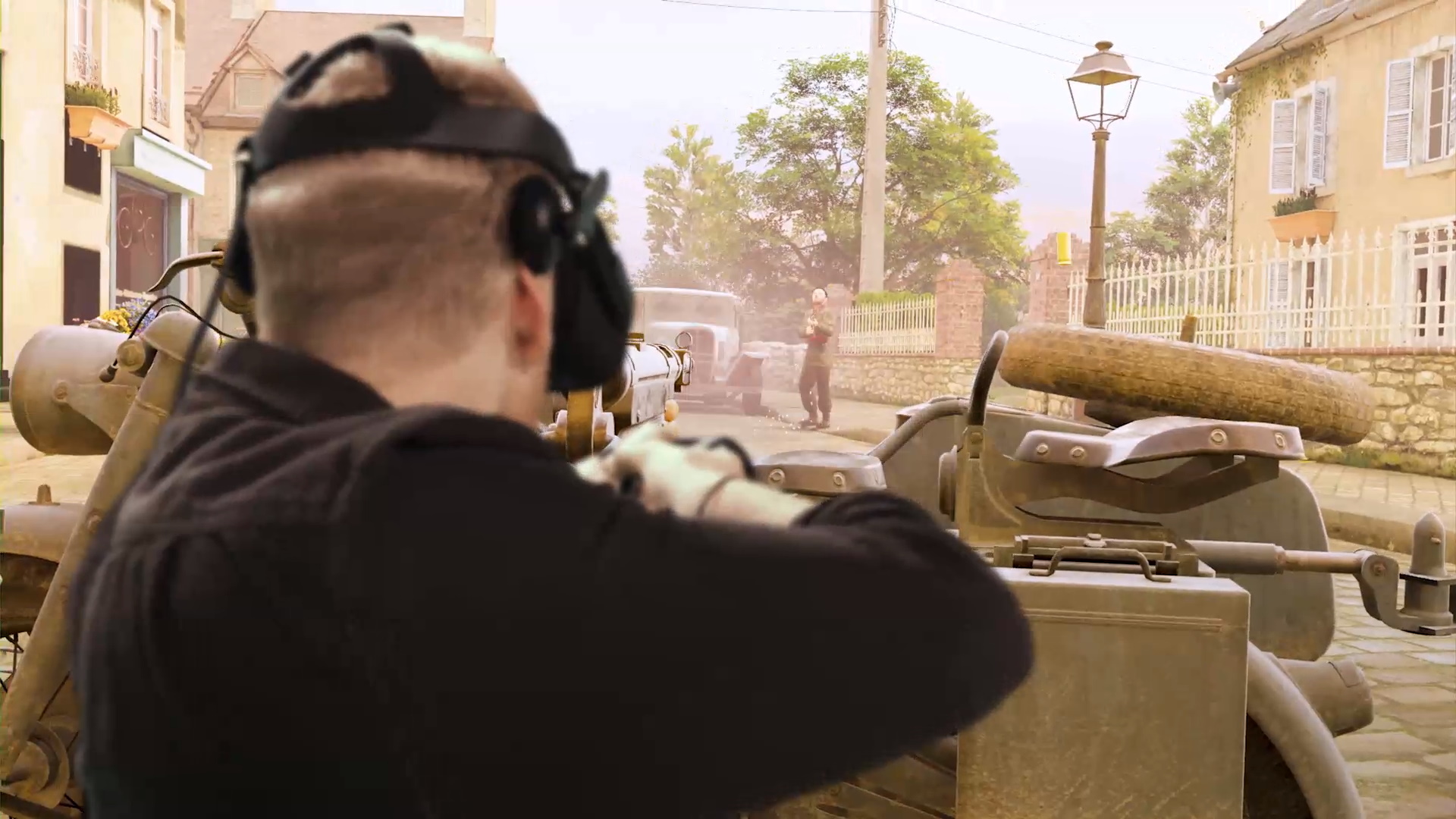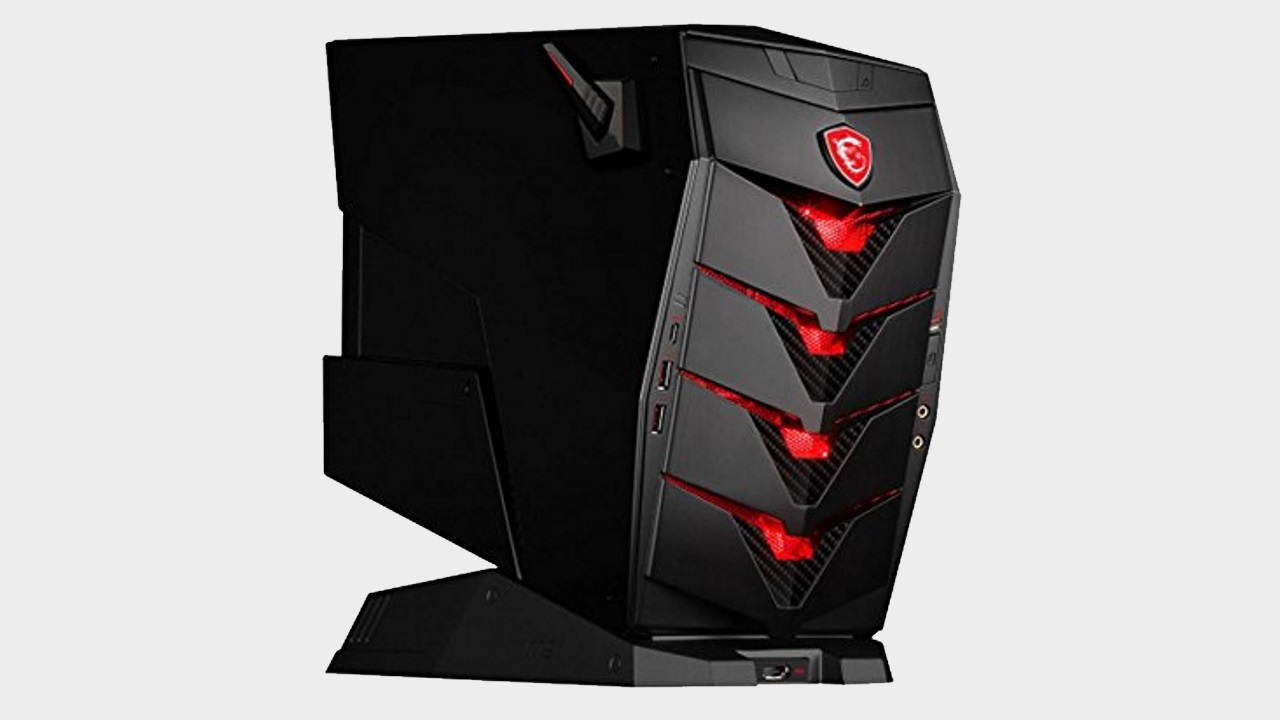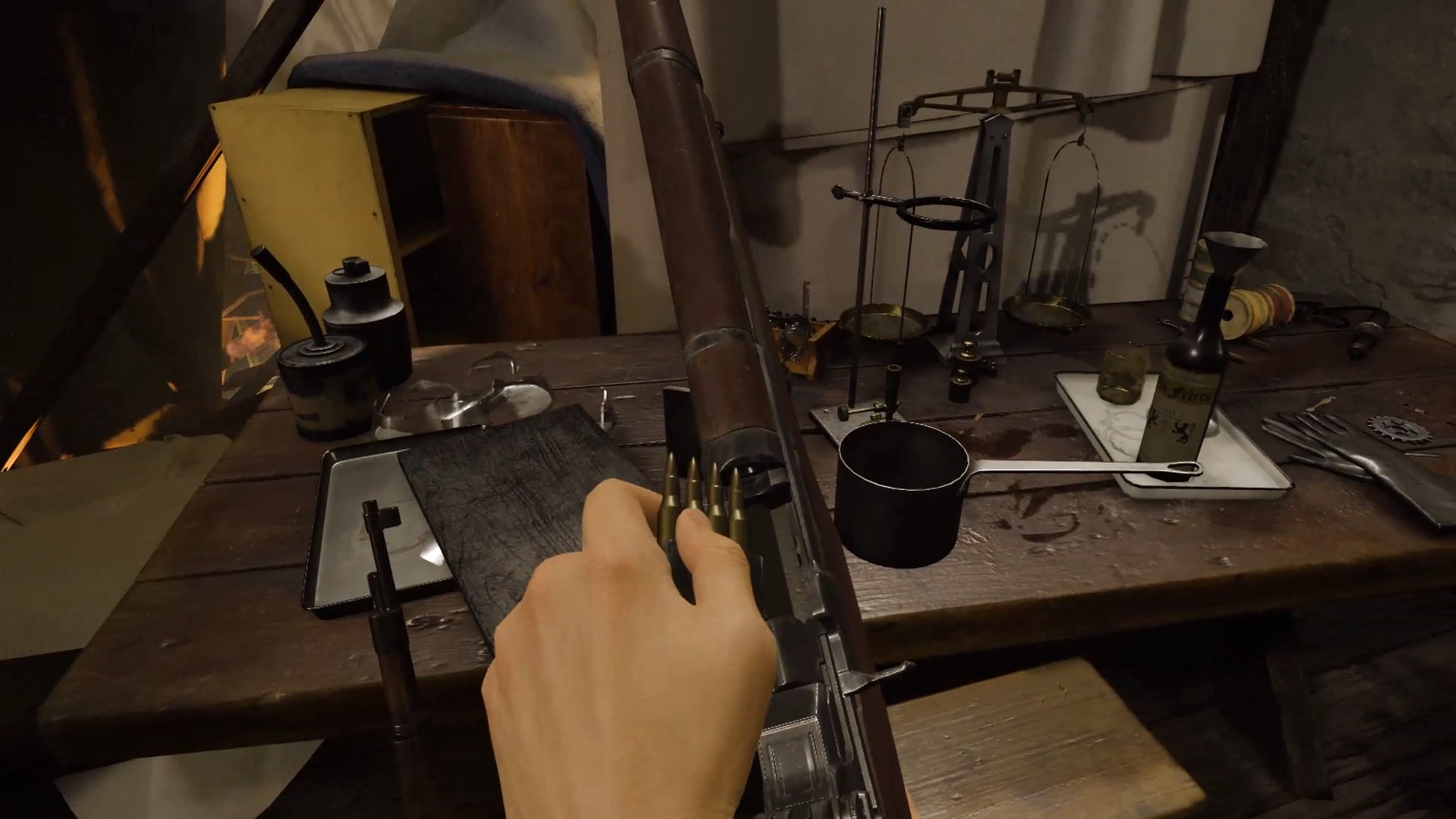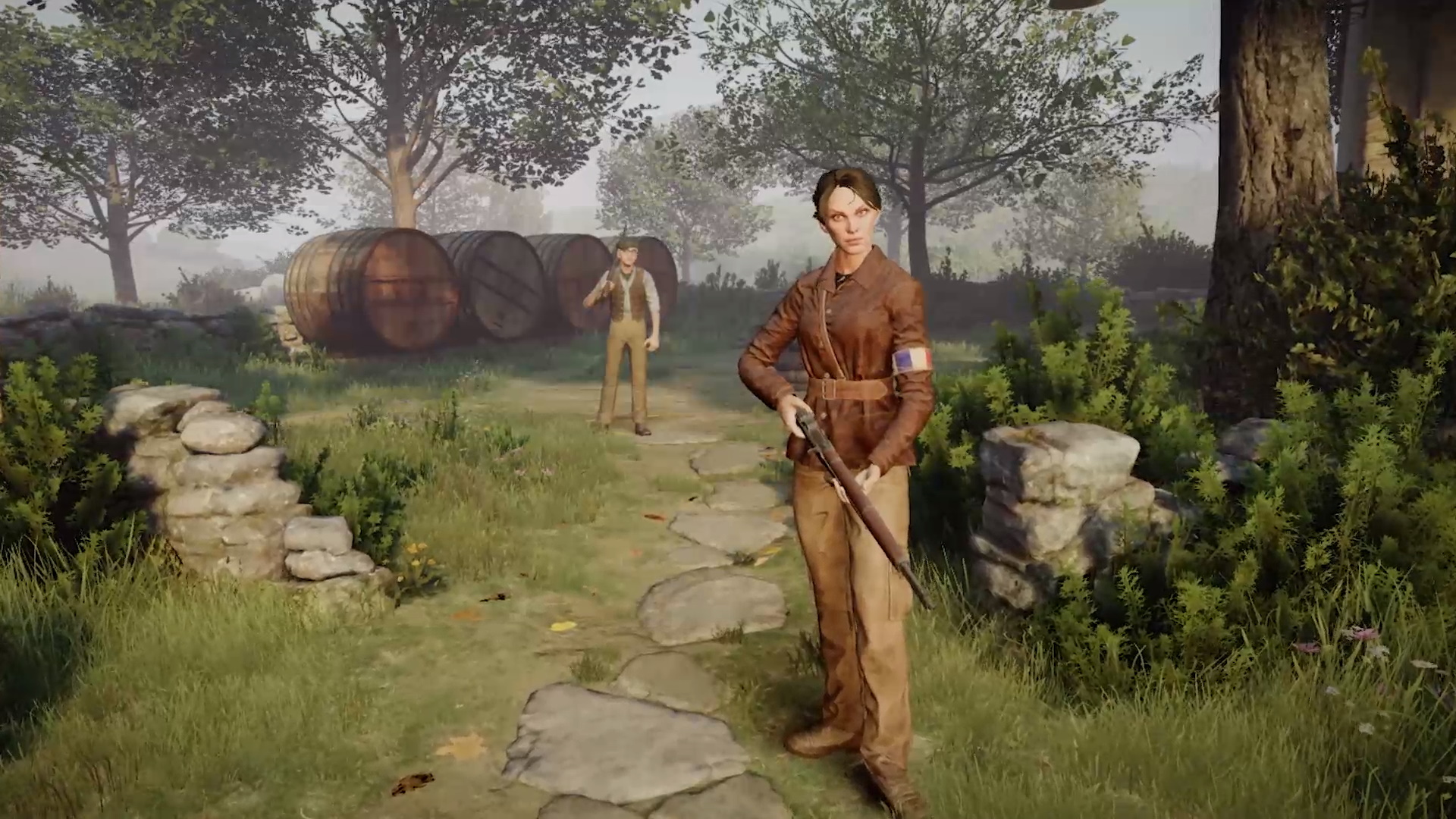I shot VR Nazis in Medal of Honor: Above and Beyond and I liked it
Shooting Nazis, throwing books, and reloading like a clown in Medal of Honor: Above and Beyond

The next Medal of Honor game is an Oculus Rift exclusive from the developers of Titanfall and Apex Legends. Respawn Entertainment, the people known for making fast, fluid, and futuristic shooting are going back to a 20 year old series about a 70-year-old war for their next project, all exclusively built for a platform that's still struggling to break through into mainstream audiences. It helps that key figures on the team, like game director Peter Hirschmann, worked on the original Medal of Honor games, and it also helps that they let me play a few missions myself even though the game's still in pre-alpha.
I started off on a firing range, designed to familiarize me with important infantry skills such as equipping weapons, operating them, and safely (for me) lobbing hand grenades. This isn't just set dressing. It was clear from the start that getting to know your guns – and the Germans' guns, if you run out of ammo or just like them better – is a huge part of the game.

Make sure you're ready to take on high-end VR games with our guide to the best gaming PCs.
I've known for a long time that the Garand, a semi-automatic rifle, was a favorite among American soldiers during the war because It was easy to operate. When its ammunition was depleted – as I learned from History Channel specials hosted by Roger Mudd – the clip would automatically eject from the rifle with a pinging sound, leaving the slot open for soldiers to slap another in. All of this I knew, on a factual level. Messing around on that firing range, and later squaring off against German soldiers in the (virtually) real thing, I started to feel that appreciation myself.
"We've spent years, literally years, refining it," Hirschmann tells me. "Each weapon's a little different. It develops those personalities, whether you have to pull the bolt every time, or you slam a cartridge into the bottom. For me, one of the greatest things is it helps tell the story of the Garand, and why that was such an important weapon to the Allied side."

There is no reload button in Medal of Honor: Above & Beyond. When your gun runs out of ammo, you have to release the empty magazine, drop it, reach down to your hip, grab a fresh magazine, insert it into the gun, and charge the weapon by pulling back its bolt or bolt equivalent. It's a lot of steps to complete an integral activity. It's fun to physically go through all those motions when you're firing lead at wooden targets. When your targets are shooting back, however, it's stressful, and you really cherish anything that streamlines the process – even more than you would a baked-in reload animation that takes .3 less seconds..
"Again, it's not about fetishizing the weapons, because you can't take them apart and clean the pieces. It's just about learning the personality, strengths, and weaknesses," Hirschmann continues. "One of the things the AI does when you're using the Garand, the clip pops out and you put the new one in, the Germans will react. We have a whole logic queue for when they hear that 'ping!' and then they'll get aggressive and start moving, because they know you're in the middle of reloading. Which happened to Allied soldiers during the war, once the Germans wised up to what was going on."
Finding my footing
Medal of Honor: Above & Beyond uses analog sticks for movement. You can step around your real-life environment to move too, but all of the levels are big enough that you'll spend most of your time pressing forward to, well, press forward. It feels right for a shooter game, though it did make crouching behind cover feel much more physically strenuous than just sprinting at the Nazis top speed. Remembering which bits you do with your controller and which bits you do with your actual body can be disorienting in an otherwise immersive experience, but I'm sure I'd get the hang of it with more time in the game.
Sign up to the GamesRadar+ Newsletter
Weekly digests, tales from the communities you love, and more
Speaking of immersion, I did have a slightly uneasy stomach the first time I moved around in-game. That went away soon enough, and it was otherwise fine, which is typical for my experience with most VR. If you struggle more with motion sickness or other concerns, hopefully an early in-game visit to the nurse's office will let you still enjoy the action – she'll help you opt in to a number of different comfort options such as screen tunneling.
Back in the war effort, I graduated straight from the firing range to a mission deep within Nazi-occupied France. I was in disguise as a German soldier, and I needed to signal nearby French resistance fighters that it was time to throw off the chains of oppression and start killin' some Nazis. The pre-mission briefing told me I would accomplish this through the power of music – by playing a certain song as a signal. I was in a bookstore and I needed to make my way upstairs to the owners' residence, where I would find the appropriate Nazi-killin' tune.
I took my time wandering around the store. I could pick up and inspect most of the books and other knick knacks lying around, immediately setting my mind to Bethesda-esque antics. Heading upstairs, I grabbed a book off a table and casually tossed it out the window. See, if I'd paid attention in OSS training, I'd know that is just the kind of behavior German soldiers look for in a double agent. My cover was blown and I failed the mission. I started back at the beginning and decided to take my role as a liberator of the French people more seriously. Through a sequence of secret-agenty things, including a piano that opened a secret door when I tapped the right notes with my outstretched finger, I found the perfect song. On vinyl, because music listeners had no choice but to be hipster audiophiles in the '40s.
A gramophone faced out the second story window, and I dropped that record like it was hot. Then it really did get hot because the Germans figured out I was up to some resistance shenanigans. It was OK that my cover was blown, because it was officially shooting time, and all of my training at the firing range was paying off. Sort of. For instance, I was able to line up enough shots to down some soldiers out in the street. However, with all the angry shouting and gunfire, I repeatedly forgot that it made more sense to pull back the bolt (or, again, bolt equivalent) with my right hand instead of awkwardly reaching over the top of the weapon and charging it with my left hand, upside down – because what the resistance really needed at this desperate moment in time was an uncertain and halting performance from a firearm-centric contortionist.
A history of historical shooters
I managed to get my disembodied hands together long enough to sweep through the streets, eventually linking up with a familiar face: Manon, the protagonist of Medal of Honor: Underground. With more than a dozen games in the Medal of Honor catalogue, including those not-so-great modern era reboots, it was encouraging to see this direct link to the series' golden age. One mission, internally referred to at Respawn as "Medal of Honor: All Stars," even has you work with Manon as well as the heroes of the original Medal of Honor and Medal of Honor: Allied Assault to sabotage the German-controlled heavy water production facility in Norway.
"To be able to share [veterans'] stories with players is something we're super excited about."
Hirschmann says going back to that fictional history was enticing for him and his team. While it was exciting to bring beloved gaming heroes back decades later, it was also a chance to share the real-life stories that inspired them. Above and Beyond brings back the Gallery feature from the early Medal of Honor games, which bookended many of its missions with brief mini-documentaries on their real-world inspiration.

"The sad thing is, the greatest generation – if I can use that label – they're in the twilight of their lives. The youngest combat vet is in his '90s. And again, we talked to both men and women who fought in the war. And to have this opportunity to be able to travel around the United States and Europe to interview them, and to bring those stories into the game and to be inspired again by them, it's a huge privilege for us. To be able to share their stories with players is something we're super excited about."
You'll be able to watch those minidocumentaries in VR, and play the rest of Medal of Honor: Above and Beyond, on PC in 2020. It will be an Oculus Rift exclusive, and it will probably remain that way in perpetuity, since Facebook funded its development. Expect to spend a good amount of time with the headset on and Oculus Touch controllers in hand – it has more than 50 levels and will apparently go well past the 10-to-12 hours of playtime that Respawn was contractually obligated to supply, Hirschmann joked.
I don't have a Rift at home, so I am one of those people that Oculus is hoping to tempt into its platform with a new wave of big-budget VR games. Unfortunately for all the efforts of Respawn and its fellow Rift-exclusive developers, most of that will probably depend on if I finally get around to building a new computer that could run said games without lighting my house on fire. But I will say this. As someone who had long ago filed Medal of Honor and the general concept of World War 2 shooters into the dusty Video Games of Yore folder (sorry, Call of Duty: WW2), I am officially ready to shoot virtual Nazis again.
I got a BA in journalism from Central Michigan University - though the best education I received there was from CM Life, its student-run newspaper. Long before that, I started pursuing my degree in video games by bugging my older brother to let me play Zelda on the Super Nintendo. I've previously been a news intern for GameSpot, a news writer for CVG, and now I'm a staff writer here at GamesRadar.



